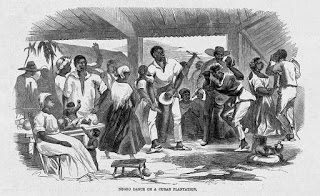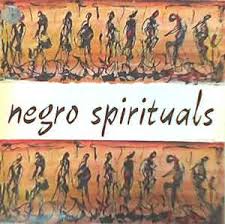The Evolution of Negro Spirituals
By Kyleigh Brown

Origin of Spirituals
During The Great Awakening, many slaves were influenced by Christianity and began developing their own practices. Since slaves had to sit in the back pews of white churches which did not give relevant sermons to them and they were not allowed to have their own churches, they made their own churches in secret called invisible churches.
The worshipping that took place was an acculturation of the way white Christians worshipped and the African cultural method of praising. The way slaves expressed their praise was through ring shouts and what could be endless songs of worship due to the dependency on call-and-response instead of a preset structure, which would later be defined as spirituals. Many of these practices/methods of expression are seen in modern black churches during service and worship.
White people looked down upon this type of expression as they believed it did not favor the Sabbath and spirituals were considered crude mimicry of their hymns. The white Methodist minister John Watson stated that it was an “evil only occasionally condemned, and the example has already visibly affected the religious manners of some whites”.
The Difference Between Hymns and Spirituals
Hymns were “metrical compositions in strophic form…loosely based on biblical scripture”. These religious songs followed the typical template in European compositions which consisted of a specific rhythm and structure.
Though spirituals are also songs of worship and drew inspiration from being exposed to white church’s hymns, the composition of these songs differ dramatically from hymns. Spirituals utilize call-and-response and audience participation/energy to worship rather than pre-written/composed songs. The structure of spirituals could change depending on these call-and-responses and had polyrhythmic form.
Arranged/Concert Spirituals
As the Jubilee Singers became a worldwide success and spirituals transitioned into arranged/concert spirituals, many slave owners began realizing the potential these groups had to bring in extra income. Since the arranged spirituals abided more by European musical composition through making the songs a set length with a set structure, white people were less opposed to the songs. As with what happened with folk music and instruments, many white people took this as an opportunity to turn a profit and attempt to add it to their culture.
Conclusion
Spirituals originate from slaves’ expression of worship which incorporated the way they worshipped in Africa. This was not favored by the Methodists and was done in secret, which led to the eventual evolution into arranged/concert spiritual. This was more favored and groups traveled as a way of fundraising (sometimes for HBCUs and sometimes for slave owners). This led to negro spirituals becoming common among future black churches.
Works Cited
Burnim, Mellonee V., and Portia K. Maultsby. African American Music an Introduction. New York u.a.: Routledge, 2015.


